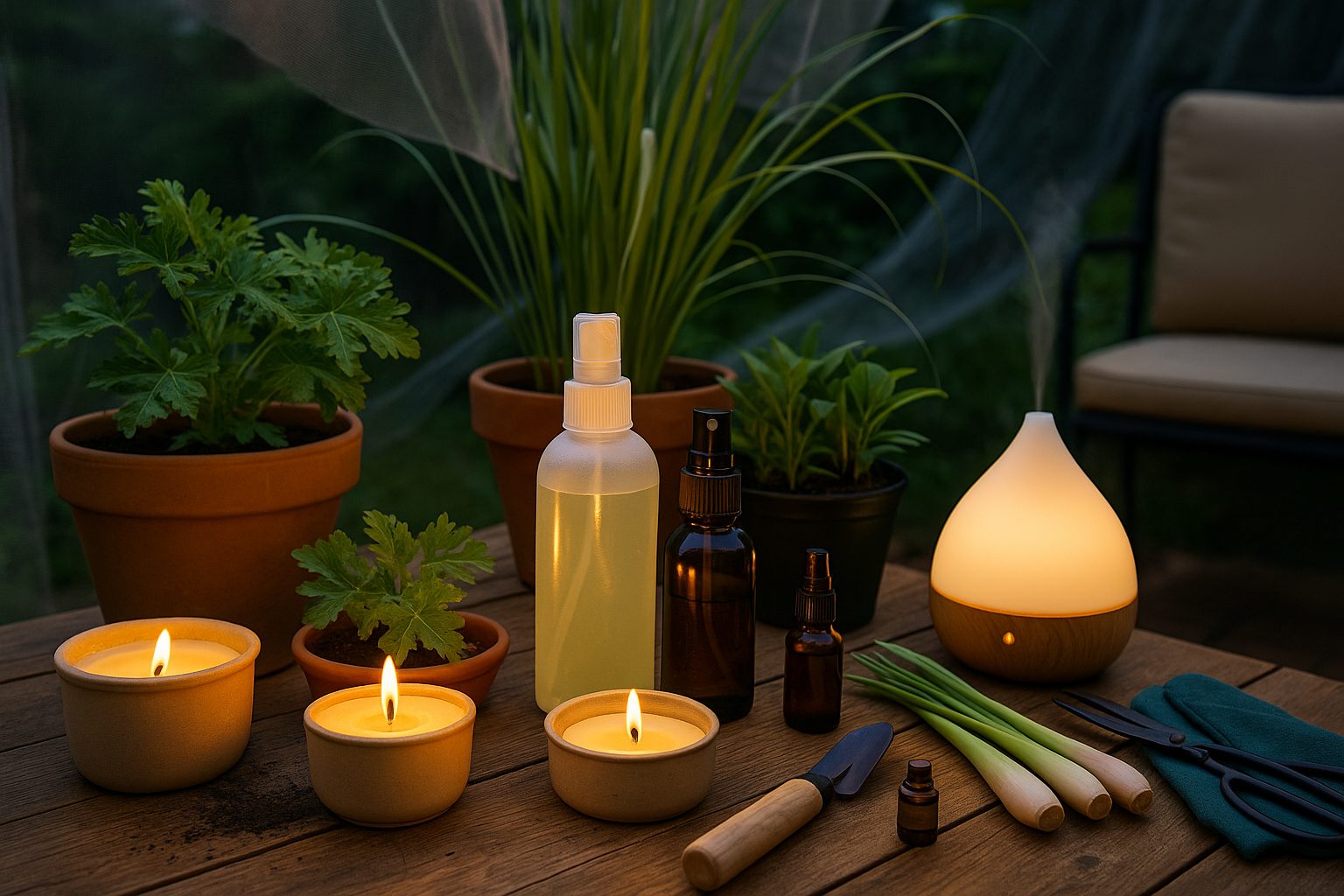Introduction
When it comes to choosing effective natural mosquito repellents, the lemongrass vs. citronella debate is a hot topic for many looking to keep pests at bay. Both plants are staples in natural wellness and pest control circles, often praised for their refreshing scents and the promise of chemical-free solutions. But are they actually the same, or do they have key differences that could impact how well they work—especially when those summer evenings roll around and the mosquitoes start biting?
In this article, we’ll break down the science behind each, compare their effectiveness, and clear up common misconceptions. Whether you’re seeking a safer alternative to synthetic repellents or simply curious about what’s in your favorite bug spray, you’ll find practical tips and clarity to help you make an informed choice for your household and outdoor gatherings.
What Are Citronella and Lemongrass?

Citronella and lemongrass are two fragrant grasses that often get mixed up because of their similar appearance and use in natural products, but they come from different species. Citronella refers to a couple of species, mainly Cymbopogon nardus or Cymbopogon winterianus, prized for their strong, citrus-like aroma. Lemongrass, on the other hand, is most commonly Cymbopogon citratus, with a slightly sweeter, lemony scent.
Both plants are harvested for their essential oils through steam distillation, a process where steam is passed through the chopped grass to capture and separate their aromatic compounds.
Citronella oil is a classic ingredient in candles, sprays, and lotions for keeping mosquitoes at bay, thanks to its robust fragrance that masks scents attractive to insects. Lemongrass oil also repels mosquitoes, though it’s more popular in cooking, teas, and aromatherapy.
When choosing between them, remember:
- Citronella’s scent is sharper and more medicinal, making it the go-to for outdoor bug protection.
- Lemongrass is milder and doubles as a culinary delight.
How Do Citronella and Lemongrass Repel Mosquitoes?
Citronella and lemongrass are popular natural mosquito repellents, and their effectiveness comes down to the specific oils they produce. Citronella, extracted from Cymbopogon nardus and Cymbopogon winterianus, contains high levels of citronellal, geraniol, and citronellol—compounds that disrupt mosquitoes’ sense of smell, making it harder for them to locate and bite humans.
Lemongrass, from Cymbopogon citratus, has a similar scent profile but is rich in citral and also contains geraniol. Both plants’ oils mask the chemical cues (like carbon dioxide and lactic acid) that attract mosquitoes.
While citronella oil has been more extensively studied, research shows pure citronella oil can repel mosquitoes for up to two hours, although its effect fades quickly as it evaporates. Lemongrass oil, thanks to its strong citral content, also offers protection and is often cited in traditional remedies, but it tends to be less effective than citronella in most laboratory tests.
In real-world use, both plants can help reduce bites when their oils are applied to the skin or diffused nearby, though frequent reapplication is often necessary. If you’re growing them at home, placing pots near entryways or patios can add an extra layer of defense—but don’t expect either plant alone to completely solve a mosquito problem.
Best Uses and Application Methods

When it comes to mosquito control, both citronella and lemongrass are popular natural choices with several easy application methods.
Sprays are the most convenient—just mist them around doorways, window screens, or even directly onto exposed skin (after a patch test).
Candles infused with these oils work well for outdoor patios, decks, and camping, creating a protective barrier in your immediate area; just remember their range is limited, so use several for larger spaces.
Electric diffusers or essential oil burners are ideal for indoor rooms, steadily dispersing the scent without an open flame—perfect for households with kids or pets.
Topical oils, which combine citronella or lemongrass with carrier oils like coconut, offer personal protection, but should only be used on adults and older children due to skin sensitivity.
In terms of availability, citronella products are widely sold in hardware stores, supermarkets, and online, whereas lemongrass options may require a visit to health shops or specialty retailers.
For barbecues, backyard parties, or camping, opt for candles or sprays outdoors, and use diffusers or mild sprays indoors, especially in bedrooms and living areas.
Always reapply or refresh products as directed, since these natural solutions tend to fade more quickly than chemical alternatives.
Benefits and Limitations of Each Repellent
Choosing between natural and chemical insect repellents often depends on your personal priorities and skin type. Natural repellents, such as those containing oil of lemon eucalyptus or citronella, tend to have lighter scents and cause less irritation for sensitive skin, making them great for short outdoor activities or children. They also usually break down faster in the environment, which appeals to eco-conscious users.
However, their effectiveness may fade after just a couple of hours, requiring frequent reapplication, and they might not provide enough protection in mosquito-heavy regions. Chemical repellents like DEET or picaridin offer longer-lasting defense and are often recommended when traveling to areas with a high risk of disease, such as during hiking or camping trips.
These chemical options may have a stronger, sometimes unpleasant odor and can irritate sensitive skin. Additionally, frequent long-term use raises some health and environmental concerns. If you’re out in your backyard for a quick evening barbecue, a natural repellent could be the ideal, low-impact choice. But for serious outdoor adventures or travel to tropical locations, a chemical option may be more reliable for your safety.
Ultimately, matching your repellent to your situation ensures the best balance of comfort and protection.
FAQs About Citronella and Lemongrass Mosquito Repellents
Many people wonder if citronella and lemongrass repellents are safe for children and pets. Generally, these plant-based oils are considered less toxic than synthetic repellents, but they can still cause skin irritation or allergic reactions in sensitive individuals. Always do a patch test and keep oils out of reach of small children and pets, who might ingest them or develop reactions after direct contact.
The effectiveness of citronella and lemongrass sprays is often short-lived, usually lasting between 30 minutes to two hours. So, reapplication is key if you want continued protection outdoors.
A common misconception is that natural sprays are enough to prevent mosquito-borne diseases like West Nile or dengue. While they can help reduce mosquito contact, no repellent—natural or chemical—offers 100% protection. It’s wise to combine them with other measures, such as wearing long sleeves or using window screens.
If you or your child have a history of allergies, consult a doctor before use.
Safety Tips and Precautions
When using essential oils or other remedies at home and on your skin, always prioritize safety by following recommended guidelines. Start by never applying oils directly to your skin without proper dilution—mix them with a carrier oil like coconut or almond oil to prevent irritation or allergic reactions.
Avoid sensitive areas such as your eyes, mouth, and any broken or inflamed skin, since oils can cause stinging or further irritation. Always perform a patch test on a small area before wider use.
Keep these products out of reach of children and pets, and never ingest them unless specifically directed by a qualified professional.
If you experience redness, itching, or any adverse reaction, stop use immediately and wash the area with mild soap and water.
For persistent skin issues or if pests like bed bugs become unmanageable, it’s wise to consult a healthcare provider or licensed pest control expert to avoid worsening the problem.
Conclusion
When choosing the right mosquito repellent, it’s important to balance effectiveness, ease of use, and safety. Whether you prefer chemical sprays, natural alternatives, or wearable devices, each option has its pros and cons depending on your lifestyle and environment. Consider factors like how long you’ll be outdoors, your skin sensitivity, and the local mosquito risk.
Remember, there’s no one-size-fits-all solution—try a few products to see what works best for you. Most importantly, stay vigilant by reapplying repellent as needed and using additional protection if necessary. Protecting yourself from mosquito-borne illnesses should always be a top priority.
